形容词副词单词表
形容词副词比较级最高级变化形式归纳
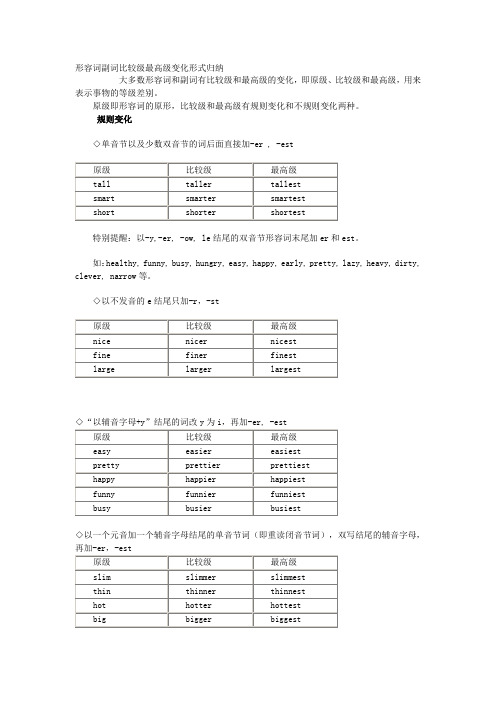
形容词副词比较级最高级变化形式归纳大多数形容词和副词有比较级和最高级的变化,即原级、比较级和最高级,用来表示事物的等级差别。
原级即形容词的原形,比较级和最高级有规则变化和不规则变化两种。
规则变化◇单音节以及少数双音节的词后面直接加-er , -est特别提醒:以-y,-er, -ow, le结尾的双音节形容词末尾加er和est。
如:healthy, funny, busy, hungry, easy, happy, early, pretty, lazy, heavy, dirty, clever, narrow等。
◇以不发音的e结尾只加-r,-st特别提醒:以形容前缀un构成的三音节形容词不适合上述情况,如unhappy----unhappier----unhappiest, untidy----untidier----untidiest ◇以形容词+ly构成的副词要在前面加 more,most特别提醒:early ----earlier----earliest◇由ING分词和ED分词演变过来的形容词(包括不规则动词如know→known)只能加more或most来表示它们的比较级和最高级。
afraid ---- more afraid, most afraid tired ---- more tired , most tiredfond ----- more fond , most fond glad ----- more glad , most gladbored ---- more bored , most bored pleased---- more pleased , most pleased◇下列形容词和副词的比较级和最高级有两种形式,即:既可加-er/-est也可加more/mostcruel, strict, often, friendly, clever◇下列形容词和副词没有比较级和最高(即表示“最高程度”或“绝对状态”的形容词和副词没有比较级和最高级)empty, wrong, perfect, unique, extreme, excellent, favourite, true, right, correct, extremely ...形容词副词比较级最高级使用注意事项◇比较应在同类事物之间进行。
情态动词 形容词 副词
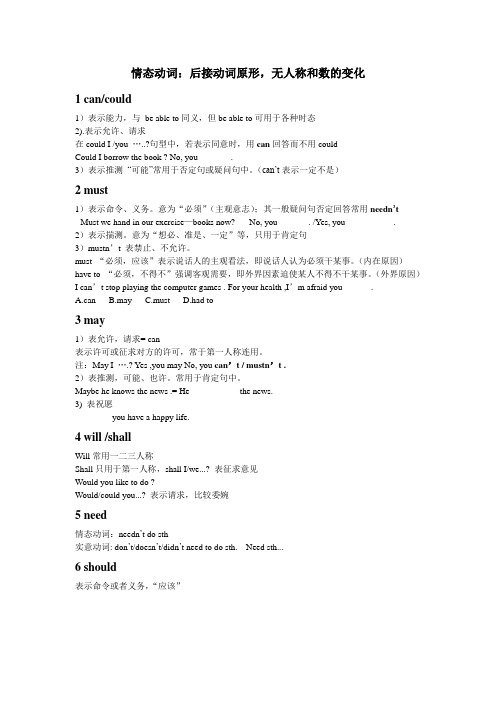
情态动词:后接动词原形,无人称和数的变化1 can/could1)表示能力,与be able to同义,但be able to可用于各种时态2).表示允许、请求在could I /you …..?句型中,若表示同意时,用can回答而不用couldCould I borrow the book ? No, you _______.3)表示推测“可能”常用于否定句或疑问句中。
(can’t表示一定不是)2 must1)表示命令、义务。
意为“必须”(主观意志);其一般疑问句否定回答常用needn’t--Must we hand in our exercise—books now? --No, you_______. /Yes, you___________.2)表示揣测。
意为“想必、准是、一定”等,只用于肯定句3)mustn’t 表禁止、不允许。
must “必须,应该”表示说话人的主观看法,即说话人认为必须干某事。
(内在原因)have to “必须,不得不”强调客观需要,即外界因素迫使某人不得不干某事。
(外界原因)I can’t stop playing the computer games . For your health ,I’m afraid you ______.A.canB.mayC.mustD.had to3 may1)表允许,请求= can表示许可或征求对方的许可,常于第一人称连用。
注:May I ….? Yes ,you may No, you can’t / mustn’t .2)表推测,可能、也许。
常用于肯定句中。
Maybe he knows the news .= He _____ _____ the news.3) 表祝愿________ you have a happy life.4 will /shallWill常用一二三人称Shall只用于第一人称,shall I/we...? 表征求意见Would you like to do ?Would/could you...? 表示请求,比较委婉5 need情态动词:needn’t do sth实意动词: don’t/doesn’t/didn’t need to do sth. Need sth...6 should表示命令或者义务,“应该”形容词和副词一、形容词1 作定语:常放在所修饰名词前,不定代词后。
英语词性表
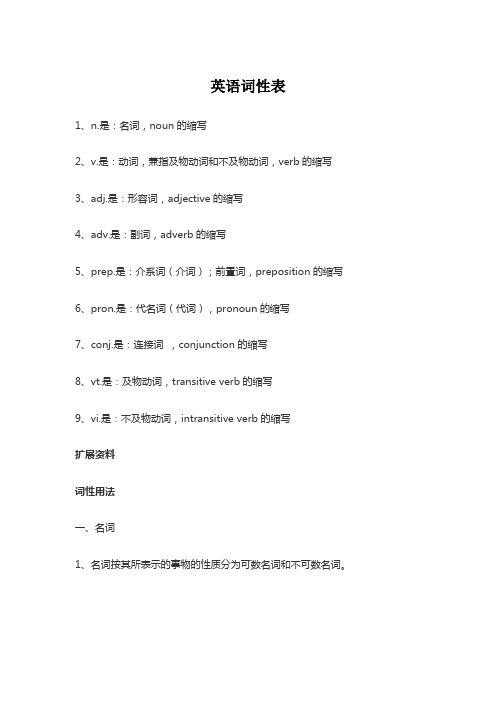
英语词性表1、n.是:名词,noun的缩写2、v.是:动词,兼指及物动词和不及物动词,verb的缩写3、adj.是:形容词,adjective的缩写4、adv.是:副词,adverb的缩写5、prep.是:介系词(介词);前置词,preposition的缩写6、pron.是:代名词(代词),pronoun的缩写7、conj.是:连接词,conjunction的缩写8、vt.是:及物动词,transitive verb的缩写9、vi.是:不及物动词,intransitive verb的缩写扩展资料词性用法一、名词1、名词按其所表示的事物的性质分为可数名词和不可数名词。
2、可数名词有复数形式,如:an apple、two apples、a bag、some bags。
不可数名词一般没有复数形式,如:milk、bread、rice。
还有一些词既是可数名词,又是不可数名词,如: ice-cream、salad、chicken。
二、形容词1、形容词修饰名词,说明事物或人的性质或特征。
通常,可将形容词分成性质形容词和叙述形容词两类,其位置不一定都放在名词前面。
2、直接说明事物的性质或特征的形容词是性质形容词,它有级的变化,可以用程度副词修饰,在句中可作定语、表语和补语。
3、叙述形容词只能作表语,所以又称为表语形容词。
这类形容词没有级的变化,也不可用程度副词修饰。
大多数以a开头的形容词都属于这一类。
例如:afraid 害怕的。
4、形容词作定语修饰名词时,要放在名词的前边。
但是如果形容词修饰以-thing 为字尾的词语时,要放在这些词之后。
三、副词1、是一种用来修饰动词、形容词、全句或其他副词的词,说明时间、地点、程度、方式等。
2、修饰动词时,副词放在动词前面。
3、修饰形容词或者其它副词时,也是放在形容词和其他副词的前面。
4、修饰句子时,可以单独放在句首,用逗号隔开。
通常表示实践和程度的副词有这种用法。
形容词副词讲解
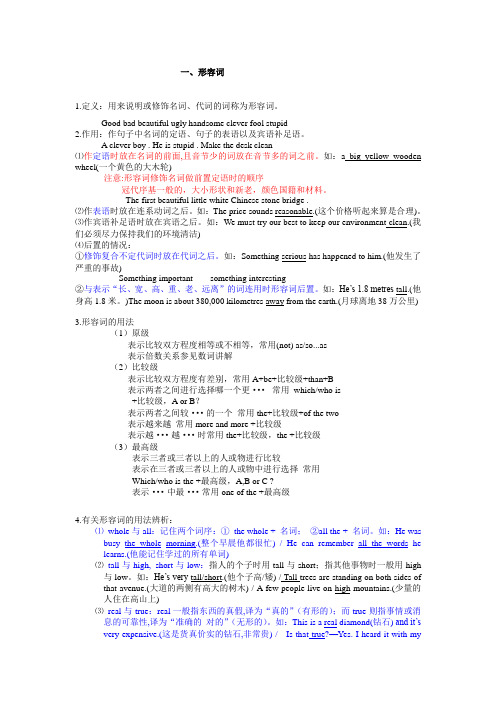
一、形容词1.定义:用来说明或修饰名词、代词的词称为形容词。
Good bad beautiful ugly handsome clever fool stupid2.作用:作句子中名词的定语、句子的表语以及宾语补足语。
A clever boy . He is stupid . Make the desk clean⑴作定语时放在名词的前面,且音节少的词放在音节多的词之前。
如:a big yellow wooden wheel(一个黄色的大木轮)注意:形容词修饰名词做前置定语时的顺序冠代序基一般的,大小形状和新老,颜色国籍和材料。
The first beautiful little white Chinese stone bridge .⑵作表语时放在连系动词之后。
如:The price sounds reasonable.(这个价格听起来算是合理)。
⑶作宾语补足语时放在宾语之后。
如:We must try our best to keep our environment clean.(我们必须尽力保持我们的环境清洁)⑷后置的情况:①修饰复合不定代词时放在代词之后。
如:Something serious has happened to him.(他发生了严重的事故)Something important something interesting②与表示“长、宽、高、重、老、远离”的词连用时形容词后置。
如:He‟s 1.8 metres tall.(他身高1.8米。
)The moon is about 380,000 kilometres away from the earth.(月球离地38万公里)3.形容词的用法(1)原级表示比较双方程度相等或不相等,常用(not) as/so...as表示倍数关系参见数词讲解(2)比较级表示比较双方程度有差别,常用A+be+比较级+than+B表示两者之间进行选择哪一个更···常用which/who is+比较级,A or B?表示两者之间较···的一个常用the+比较级+of the two表示越来越常用more and more +比较级表示越···越···时常用the+比较级,the +比较级(3)最高级表示三者或三者以上的人或物进行比较表示在三者或三者以上的人或物中进行选择常用Which/who is the +最高级,A,B or C ?表示···中最···常用one of the +最高级4.有关形容词的用法辨析:⑴whole与all:记住两个词序:①the whole + 名词;②all the + 名词。
小升初英语复习:形容词、副词

(1) “A + be +形容词比较级+ than + B”意思为“A比B更……”。
如:My pen is cheaper thanyours . 我的笔比你的便宜。
Tom runs faster thanyou. 汤姆比你要跑得快。
(2) 进行选择性比较时,可用“which/ who+be+形容词比较级,A or B ?”表示“A和B中,哪一个/ 谁更……..?”。
如:Who is taller (tall), Lucy or Lily? 露西和丽莉谁更高?(3) “比较级 + and + 比较级”或“more and more +原级”表示“越来越……”如:It becomes warmer and warmer when spring comes.春天来了,天气变得越来越暖和了。
(4) “the +比较级……, the+比较级......”,表示“越……越……”如:The more money you make, the more you spend.钱你赚得越多,花得越多。
温馨提示:a bit, a little, much, a lot, still, even 可修饰形容词或者副词的比较级。
Peter is much taller(tall) than Daming. 彼得比大明高得多。
(三) 最高级用法形容词、副词的最高级形式主要用来表示三者或三者以上人或事物的比较,表示“最……”的意思。
句子中有表示范围的词或短语。
如:of the three, in our class等。
结构:(1) Who + be + the + 形容词最高级,A, B or C? 表示“ABC中谁最…..?”Who is the most beautiful (beautiful)girl, Lily, Lucy or Lingling?丽莉、露西和玲玲谁是最漂亮的?(2) Which + be + the + 形容词最高级,A, B or C? 表示“ABC中哪一个最…..?”Which bag is the heaviest(heavy), the yellow one, the red one or the black one?哪个包包最重,黄色的,红色的还是黑色的?(3) A + 谓语 + the + 形容词/副词最高级 + 表示范围的短语(of/ in…) .表示“A在哪一范围内是最…..?”如:He is the tallest (tall) in our class. 他在我们班里是最高的。
初中英语形容词和副词---比较高级及最高级单词汇总
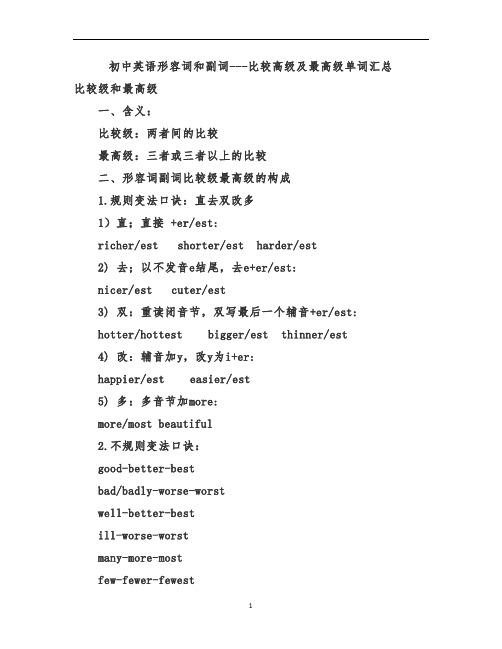
初中英语形容词和副词---比较高级及最高级单词汇总比较级和最高级一、含义:比较级:两者间的比较最高级:三者或三者以上的比较二、形容词副词比较级最高级的构成1.规则变法口诀:直去双改多1)直;直接 +er/est:richer/est shorter/est harder/est2) 去;以不发音e结尾,去e+er/est:nicer/est cuter/est3) 双:重读闭音节,双写最后一个辅音+er/est:hotter/hottest bigger/est thinner/est4) 改:辅音加y,改y为i+er:happier/est easier/est5) 多:多音节加more:more/most beautiful2.不规则变法口诀:good-better-bestbad/badly-worse-worstwell-better-bestill-worse-worstmany-more-mostfew-fewer-fewestmuch-more-mostlittle-less-leastold-older-oldest(年龄较大)old-elder-eldest (辈分较高),如:elder brother 哥哥far-farther-farthest(距离远)far-further-furthest(程度远,如 further study: 深造)3.比较级原则口诀:①单单相比-The apple is bigger than that one.②复复相比-My books are heavier than her books.③同类相比-His head is bigger than mine.三、句型:常考短语和句型1.原级Tigers are as dangerous as lions.1)as +adj./adv.原级+ as,A和B一样This apple is as big as that one.2)not so/as +adj./adv.原级+ as,A不如BThis apple is not so/as big as that one.Evan is as handsome as Nay.Evan is not as/so handsome as Nay.2.比较级-递增比较Elephants are bigger than zebras.1) adj./adv.比较级+than 比….更…….his apple is bigger than that one.2) 修饰比较级的词:much, a lot, far, even, still, a little,a bit, anyI am a little more handsome than Evan.3.特殊句型1) 比较级 + and + 比较级Rambo is becoming fatter and fatter.Cars are getting cheaper and cheaper.Houses are getting more and more expensive.2) The+比较级,the+比较级…越…,越…The harder you work, the higher scores you will get.The more you eat, the stronger you will be.3) one of the + adj.最高级 + 名词You are one of the most clever students in China.4) the + 序数词 + adj.最高级 + 名词Elephants are the second largest animals in the world.四、最高级1.原则:三者或三者以上比较2.最高级+of+与主语相同的性质:She is the tallest of the girls.最高级+in+与主语不同的性质:She is the tallest in the class.3.最......之一:one of +the+最高级+名词复数:Mozart is one of the most famousmusicians in the world.4.最高级不加the的情况*已有其他修饰词。
形容词变副词的规则
形容词变副词的规则:1.一般情况下直接加“ly”,如quick---quickly,wise-wisely,polite -politely,nice-nicely,glad-gladly, 形容词变副词通常是加ly,其变化有规律可循,请记住以下口诀:一般直接加,“元e”去e加,“辅y”改i加,“le”结尾e改y。
以ll结尾的词只加y full-fully dull-dully分别举例如下:quick—quickly,true—truly,happy—happily, possible—possibly.Full-fully另外:一、在形容词词尾直接加-ly。
如:real-really; helpful-helpfully; careful-carefully;hopeful-hopefully; slow-slowly; quick-quickly; quiet-quietly二、以辅音字母加y结尾的形容词,如果读/i/要变y为i,然后再加-ly。
如:busy-busily; angry-angrily; easy-easily ,happy-happily, hungry-hungrily,如果读/ai/就直接加ly如shy-shyly dry-dryly sly-slyly三、某些以辅音字母加不发音的字母e如le结尾先去掉e,然后再加-y和以-ue结尾的形容词要先去掉e,-ly。
如元音字母加ly时直接加ly如sole-solely如: terrible-terribly; true-truly; simple, terrible, incredible,probable,gentle-gently另外,副词还可以由形容词加前缀a-得来,如:loud (adj.)-aloud (adv.)此外,部分名词加后缀也可变成副词,如:part-partly。
例句: It is partly her fault. 有部分是她的错。
(完整版)初二形容词副词比较级、最高级
比较级&最高级一、分类:形容词和副词有原级、比较级和最高级三级.原级变为比较级和最高级有规则变化和不规则变化两种。
二、规则变化:形容词和副词的比较级和最高级的变化方法如下(1) 符合规则的:(2)几个不规则的形容词和副词的比较级和最高级如下表:三、形容词和副词的原级、比较级和最高级的用法:1e.g。
This room is bigger than that one. I am taller than you。
This lesson is more difficult than that one.注意:①修饰比较级的词有 a little, a bit ,a few , a lot ,much, even,still,far,rather,any 等表程度。
e。
g。
Today is _________ colder than yesterday(冷得多/一点)②为避免重复,在从句中常用the one 代替可数名词单数形式,调和ones 或those代替可数名词的复数形式,that代替不可数名词.E。
g。
The weather in Tianjin is colder than______of Guangzhou in winter.2、表示“…不如…”,用“less+原级+than”结构e。
g. The book is less difficult than that one. The film is less interesting than that one3、不与其他事物相比,表示本身程度的改变,用“比较级+and+比较级”结构,意思是“越来越…”e.g。
The weather is getting______ ______ 。
______ (越来越暖和)Our country is becoming _____ ______ . ______ (越来越漂亮)4、表示“两者之间比较。
形容词变副词,最全,最有条理的规则
形容词变副词的五大类
一、单词以e结尾的,做题步骤
1.看是不是特殊单词
True truly 真实地,确实地
Due(预定的,预期的) duly准时地
Whole 整体的,完全的wholly 完全,整体地
2.是不是以“辅音字母+le”结尾,
若是去e加y:possi b le-possibly;sim p le-simply;gen t le-gently
3 如果不是上面两种情况,直接加ly
Complete- completely ; polite-politely;
immediate-immediately; wide-widely
wise –wisely
二、If “y”结尾且读音为/i/
变“y”为“i”,再加“ly”
happy-happily heavy-heavily easy-easily
shy? -shyly
三、If 以ic结尾
1.是不是public-publicly公共地
2.如果不是,则加ally
basic-basically;
四、If 以ll结尾,则直接加y
full-fully small- smally
五、其他不符合以上四种情况的,直接加ly
!!!注意以下带ly的是形容词
friendly友好的lively充满活力的,生气勃勃的lovely 可爱的lonely 孤独的
likely可能的(be likely to do)。
小学英语语法形容词,副词的用法总结整理归纳
eg:He is taller than me. 他比我高。
The girl is more beautiful than before. 这个女孩比以前漂亮多了。
Jack runs faster than his brother. 杰克跑得比他哥哥快。
②“which/who is + 形容词/副词比较级, A or B ?”
① 时间副词一般放在句尾或句首,有时可以放在动词前面。
eg: I often do exercises in the morning. 我经常在早上做操
Tomorrow many people will go for a picnic.明天很多人将要去野餐。
② 地点副词一般放在句尾,有时可以放在句首(如 here/there)。
always(一直),usually(通常),often(经常), sometimes(有时候)never(从不),once(一次), twice(两次)
疑
问
how(如何),where(在哪里),when(什么时候),
主要是用来构成特殊疑问句。
副
why(为什么)
词
三、形容词/副词的位置 (1)形容词的位置
意思为“A 和 B,哪一个更……”。
eg:which is bigger,the sun or the moon ?
哪一个更大,地球还是月亮?
Who is cleverer,Lily or Lucy ?
谁更聪明,莉莉还是露西?
③“the + 形容词比较级 + of + 名词”,意思为“两者之间较……的一个”。
小学语法—形容词和副词
一、形容词/副词的定义
形容词:用来修饰名词或者部分代词的词。形容词一般翻译成“……的” 副词:修饰动词、形容词、其他副词或全句的词,表明方式,时间,地点、程度 等。副词一般翻译成“……地/得” eg:She is a beautiful girl.他是一个漂亮的女孩。 (形容词修饰名词)
- 1、下载文档前请自行甄别文档内容的完整性,平台不提供额外的编辑、内容补充、找答案等附加服务。
- 2、"仅部分预览"的文档,不可在线预览部分如存在完整性等问题,可反馈申请退款(可完整预览的文档不适用该条件!)。
- 3、如文档侵犯您的权益,请联系客服反馈,我们会尽快为您处理(人工客服工作时间:9:00-18:30)。
Adjectives(形容词)active afraid △after-school △alike *alive all all-time aloneamazing American a ngry another any Asian asleep *attractivebaby(幼小的) bad △bald beautiful best better big blackblind △blonde blue bored boring both brave brightBritish broad brown △brownish △businesslike busy △cardboard carefulcareless certain cheap cheerful Chinese city clean cleverclose closed *cloudy cold colourful comfortable coming complete△confident △contented *convenient cool *correctcountry(乡村的) crazy △creative crowded cute dailydangerous dark dead deaf deardelicious delightful detective different difficult *digital *dirty disableddishonest *disturbing dream dried each earlyeasy easy-goingeducational eighth elderly *electronic △elegant eleventh empty endangered energetic English enjoyable enough every △evil excellent excitedexciting expensive△experienced *extra fair famous *fancy far△farewell fashionable fast fast-food fat favourite fifth finalfine first *fit flat △fluent foggy *following △forked△formal fourth free fresh friendly frightened frightening frostyfull fun fund-raising funny further future *general △generousgentle glad *golden good good-looking grateful greatgreengrey *guilty handsome happy hard hard-working harmless △harshhealthy heavy helpful helpless highhomeless honest *hookedhot hungry △ideal ill △imaginative *impatient impolite importantimpossible incomplete incorrect △indigo △indoor △informal interested interesting *international *irregular △itchy Japanese large last late lazyleast left less light likely little lively *livinglocal l ocked lonely long *long-winged lovely lucky main*major *male many maple Martian meaningful medical *mediummetal mixed modern modest most movable *musical naturalneat *necessary △needy nervous new next nice ninth noisy *normal north-eastnorthern OK old one online only open o range *organized other *outdoor △outgoing overown pale paper patient peaceful perfect personal physicalpink pleasant *pleased △pointed *poisonous polite polluted poorpop popular possible powerful practical pretty protected proudpublic purple quick quiet rare ready real △realisticrecent red *regular *related relaxed right *roast △romanticround rude sad safe *salty same △satisfied △scaredsecond △secondary secret △selfish serious seventh several sharpshiny *shocked short shy △shoulder-length sick silly similar simple sixth s leepy*slight slim slow small smart smiling *smooth snowy *social soft △solar some sorry △sour south-east special △spicy sporty square straightstrange △stressed strictstrong △stubborn successful such suitablesunny super sure surprised *surprising sweet △talented talltasty *teenage tenthterrible thick thin third thirsty △thoughtful tidy tight tiredtop total tough *traditional true twelfth twentieth △typicalunable uncomfortable *uncommon unfair unfriendly unhappy unhealthy *unhelpful unimportant unkind unlucky unnecessary unpleasant unpopular *untidy unusual unwelcome up-to-date useful useless valuable △violet △V-neck △voluntary△wanted warm weak △web-footed weekly welcome well well-known*well-paid Western wet white whole wild willing windywise wonderful wooden worried *worth wrong yellow young △yummyAdverbs(副词)about actually afterwards again ago *ahead all almostalone already also always angrily *anyway anywhere awayback badly before bestbetter carefully certainly clearlycompletely correctly earlyeasilyeighth either eleventh elseenough *equally especiallyevenever everywhere excitedly farfarther farthest fast fifthfinally first *firstly △fluentlyfourth freely further furthest*gently *happily hard heavilyhere high highly hopefullyhow however incorrectly indeed△indoors △instantly instead justlate later live loudlyluckily maybe mostly nearbynearly never nicely ninthno *normally not now*obviously off often onceonline only *otherwise out△overall *particularly peacefully perhapsplease probably properly quicklyquietly quiterather really*recently *regularly right sadlysafely second seldom seventhshortly *simply sixth s lowlyso softly sometimes somewheresoon specially still straightsuddenly sure tenththenthere*therefore third togethertonight too twelfth twentiethtwice △upright usually verywell what w hen where why wide w ildly yes yet。
